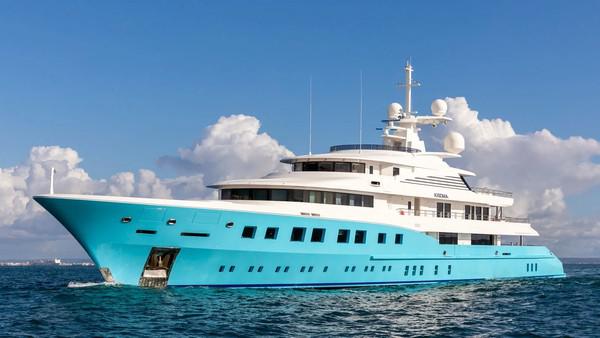Arrested because of the sanctions of the property of wealthy Russians in the world is becoming more and more. But the maintenance of yachts and villas is expensive for the budgets of the countries concerned. Yacht example Dmitry Pumpyansky shows that selling frozen assets for debts can be a way out, says Vladimir Khantimirov, managing partner of Asterisk law firm
After the start of the “special operation”* in Ukraine in February 2022 and the imposition of tough sanctions against Russia by Western countries, news about the arrest of large assets of Russian oligarchs abroad became regular. The only thing that remained unknown was how exactly the countries that seized the property of rich Russians would dispose of it.
But already at the end of June, the Supreme Court of Gibraltar I decided – Axioma yacht, owned by Russian billionaire Dmitry Pumpyansky, will go under the hammer. Only in March, Axioma was under arrest, and after only two months it became an auction lot. How did it happen?

Forbes.ru, 06/27/2022, “The Supreme Court of Gibraltar decided to sell the yacht of billionaire Pumpyansky”: As Business Insider points out, is the first superyacht owned by one of the richest Russians to be put up for auction. In most cases, without a court decision, the authorities cannot sell the arrested yachts, and their maintenance and maintenance require costs in the amount of 10-15% of the value of the vessel, the newspaper writes.
The largest US bank JPMorgan is behind the arrest of Pumpyansky’s yacht, which fell under the sanctions, Bloomberg reported at the end of March. […]
Apparently, the yacht was once acquired by Pumpyansky at the expense of loan funds from JPMorgan and was pledged to the bank, Vladislav Zhuravlev, legal adviser at the Sovet legal group, explained to Forbes. According to him, the bank is trying to foreclose on the yacht because of the delay on the loan, so the vehicle was seized. “However, it is not entirely clear how this is consistent with the statement by British Foreign Secretary Liz Truss that the yacht is “exclusively owned by Pumpyansky.” In any case, foreclosure on the yacht due to debt to the bank will remove it from the sanctions, ”said the lawyer.
Pumpyansky hit under EU sanctions on March 10, a few days later sanctions against him introduced Great Britain. At the end of March, the head of the British Foreign Office announced that the Axioma yacht ultimately belongs to Pumpyansky Liz TrussBloomberg notes. Pumpyansky after being included in the sanctions lists ceased to be the beneficiary of the Pipe Metallurgical Company, in which he owned 90.6%, and left its board of directors. — Inset K.ru
From freezing to confiscation
The existing rules only allow the freezing of assets. The European authorities have the right to confiscate property only if it is necessary for public needs, of course, with the payment of commensurate compensation. While Western countries are in search of a solution to the question of what to do with the seized property. For example, in the US Congress draft law is being preparedpermitting the confiscation of the property of persons subject to sanctions.
To date, the largest courts of Russian billionaires have been arrested: yacht “A” founder of Eurochem Andrey Melnichenko, Lady M co-owner of Severstal Alexey Mordashov and yacht Lena co-owner of Novatek and Sibur Gennady Timchenko. If earlier the owners could not worry about the safety of their property and could only wait for the easing of the sanctions regime, then the Axioma case showed that the threat hung over all the seized assets.
According to one version, the rapid sale of the vessel was the result of high costs for the maintenance of the yacht, which can reach 10-15% of the value of the vessel. Since the yacht is under arrest, all expenses, including the maintenance of the boat, are borne by the country that arrested it.
In addressing the issue of costs, the Gibraltar Court has been more radical than the Fiji Court, which decided not to sellbut just pass the billionaire’s yacht Suleiman Kerimov Amadea USA as a richer country that can afford the storage and maintenance of the toys of the oligarchs. But Italy declares that it will not regret the seized property. This year the country will spend almost €13.7 million for the maintenance of Russian assets. The government has already prepared amendments, according to which it will be able to sell the detained property to recover costs.
Debt bypassing sanctions
The examples given confirm the clearly emerging trend. Western countries legalize the sale of expensive property to cover costs. But in the case of Axioma, another important direction can be traced – the sale of seized property for debts.
In fact, Axioma is not owned by Pumpyansky, but by Pyrene Investments, whose shareholder is the Cypriot company Ferdberg Holding company, which is already directly owned by the oligarch. According to public sources, JP Morgan in December 2021 provided Pyrene Investments with a loan in the amount of €20.5 million secured by the yacht Axioma. With a demand for the return of this debt, JP Morgan went to court, which led to the arrest of the yacht.
Both in the USA and in Russia, agreements on opening a credit line often contain conditions, in case of violation of which the bank has the right to demand early repayment of credit funds. In countries of case law, parties tend to include all possible risks in contracts. A classic case of violation of the terms of the contract is the inclusion of the borrower in the sanctions lists and failure to notify the bank about the change of the beneficiary. Apparently, these conditions were violated.
After the sale of the yacht, the funds will go to the disposal of the Supreme Court of Gibraltar, which will determine their future fate. According to experts, the market value of the vessel is about €60 million, which, even taking into account all costs, significantly exceeds the amount of the debt. At the same time, it is not known whether the owner of the yacht will receive this difference. Probably, it will either remain on the deposit of the court, or will be transferred to one of the owner’s international accounts, to which he does not have access due to sanctions.
Do not forget about the existence of secondary sanctions, which played an important role in this matter. Even if we assume that Pumpyansky (which is unlikely given the freezing of accounts) could pay JP Morgan, the bank is not entitled to accept money from him directly. For this reason, large companies try to adhere to the “over compliance” principle and refrain from direct or indirect interaction with prohibited persons. Otherwise, the bank itself faces serious consequences, up to criminal cases. The USA already there is a mechanism the use of secondary sanctions against violators of the sanctions regimes against Iran and Venezuela. Surely, in the near future we are still waiting for a lot of “domestic” cases – business is business, and foreign companies will try to circumvent sanctions in a variety of ways.
By his example, JP Morgan showed how all Western creditors can get their money back and not fall under secondary sanctions. Surely other Russian billionaires also have obligations to foreign banks and companies with which they cannot pay due to the blocking of accounts. In order to get their money back from large borrowers with ties to Russia, creditors can start going to court to demand repayment of the debt, and the enforcement of the judgment will be ensured through the sale of seized assets. Appeal of such a verdict will be an almost impossible task for the Russians who fell under the sanctions. If the Axioma story becomes a precedent, then the authorities of the countries where the arrested yachts and villas are located will be able to get rid of them, and along with the costs associated with their maintenance.
The opinion of the editors may not coincide with the point of view of the author
* According to the requirement of Roskomnadzor, when preparing materials on a special operation in eastern Ukraine, all Russian media are obliged to use information only from official sources of the Russian Federation. We cannot publish materials in which the ongoing operation is called an “attack”, an “invasion” or a “declaration of war”, unless it is a direct quote (Article 57 of the Federal Law on the Media). In case of violation of the requirement, the media may be fined 5 million rubles, and the publication may also be blocked.









